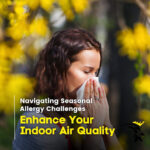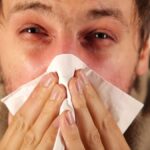Wildfires have always been a problem for Northern Colorado residents, but never quite to the degree that we’ve seen these past few years. In fact, 2020 alone saw a record-setting blaze drape the entire front range in a choking, orange haze. Couple this with the Coronavirus outbreak forcing more of us indoors for longer periods of time, and you have a recipe for very poor indoor air quality.
How Wildfires in the Mountains Impact Your Home’s Air
A few weeks back from this writing, it may have been more difficult to convince Northern Colorado residents of the direct impact fires have on our communities and in the air of our homes, but the recent fire season has likely proven that point for us to some degree.
But just what is going on? Why and how does smoke outside of our homes cause a drop in our indoor air quality?
Fires Create Dangerous Outdoor Air
Here’s where we tell you what you already know: during a wildfire, surrounding areas are likely to have dangerous outdoor air. While that’s not a shocker to local residents, what may come as a surprise is just how much worse the air can get.
Under normal conditions, we enjoy impressively-clean outdoor air when considering the size of the metropolitan area in Northern Colorado.
During a wildfire, however, that can jump dramatically in the other direction.
For example, a normal AQI (Air Quality Index) for Fort Collins is around 20-30. During a nearby wildfire, that number jumped to over 200. As you can imagine, lower is better on this scale. Check out the Colorado Air Quality Report from the Department of Public Health & Education to see today’s conditions, as well as those in recent days.
To put this into perspective, that’s worse than an average day in Dubai, the most polluted city on the planet.
Since our residents are obviously unaccustomed to this level of air pollutants and, in many cases, have not employed solutions against this level of air quality, wildfires can pose a serious health risk.
Some Outdoor Air Will Get In
Despite the massive leap forward we’ve taken in constructing homes with energy-efficient windows, doors, siding, roofing, and more, particles from the outside still find their way into even the most well-constructed homes. While you should try to keep windows and doors closed as much as possible, it is important to recognize that alone will not be enough to keep all outdoor contaminants out.
During a wildfire, this means that your indoor air quality will also drop as a result of the added particles present in the outdoor air.
These particles can cause or irritate the following, even if you remain indoors:
- Burning eyes
- Runny nose
- Sore throat
- Headaches
- Illnesses, such as bronchitis
- Agitate chronic conditions, such as asthma, allergies, and certain heart and lung diseases
Wildfires Have Become More Likely
Colorado climate scientists say that we should expect to see more wildfires like we’ve seen in 2020, according to reporting from Colorado Public Radio. Anecdotal, anyone that’s lived in Northern Colorado for a decade or more can attest that fires have been more likely to start and have burned for longer in recent years than any in memory.
This is likely due to Colorado’s average temperatures rising and the driest parts of the year being even more dry than usual. This recipe creates the perfect conditions for wildfires to start (and continue) across the state.
We’re Spending More Time At Home
Under normal conditions, the top pollutant in most homes would be its residents. Dust from skin and hair combines with chemicals and other contaminants from our possessions to create contaminants that can swirl around in the air for far longer than you’d like to imagine.
Since we’re now spending more time at home than ever amidst the coronavirus pandemic, the indoor air quality of our homes is likely at a lower spot than it normally would be when parents are off at work and children are spending time outdoors or in school.
Couple this together with choking smoke from a wildfire, plus the contaminants in the air entering our homes anyway, and you have a recipe for far worse indoor air than you may have come to expect from your home.
We Can Help
At Lion Home Services, we’re happy to help homeowners increase their home’s indoor air quality with our Whole House High-Efficiency Air Cleaner systems. We use solutions for trapping or eliminating the VOCs (Volatile Organic Compounds) in your home to greatly reduce the contaminants in the indoor air.
Check out everything our team has to offer your home and decide if an indoor air quality addition to your home’s existing HVAC could be just the thing to keep your home’s air fresh and clean regardless of what is happening in the world outside.









